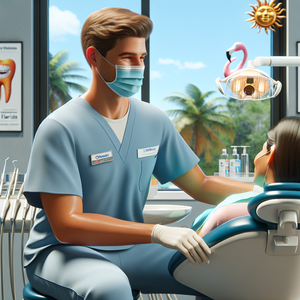The Future Smile Keepers: Redefining Dental Hygiene in a Tech-Driven Era

Technological innovation has already begun to reshape the dental industry. AI-powered tools are demonstrating remarkable capabilities in diagnosing oral health issues. For example, algorithms trained to analyze dental X-rays can now detect cavities, gum disease, and other conditions with extraordinary accuracy. This allows for quicker and more precise diagnoses, reducing human error and improving treatment outcomes. Similarly, robotics is advancing in automating tasks such as teeth cleaning, orthodontic adjustments, and even complex surgical procedures. While these developments may sound like a threat to human professionals, they actually present an opportunity for dental hygienists to redefine their roles. Automation can take over the repetitive, mechanical aspects of their job, such as scaling and polishing teeth, freeing up time for hygienists to focus on more complex and impactful tasks. For instance, harnessing AI data, hygienists could craft highly personalized oral health plans for patients. These plans might include tailored preventive measures, dietary recommendations, and advice on behavioral changes to enhance oral health. In essence, dental hygienists will evolve from technicians into oral health strategists, empowering patients to take charge of their dental well-being. Technology will not replace their expertise but will serve as a tool to enhance it, allowing for a more comprehensive, patient-centered approach to care.
Enhancing the Human Connection in Dentistry
While technology excels at efficiency and precision, it cannot replicate the human touch. The dental hygienist’s role extends far beyond technical expertise; it involves creating a safe, empathetic, and trusting environment for patients. This human connection will remain irreplaceable, even in the most technologically advanced dental offices. Consider a patient who experiences significant anxiety about dental visits—a common issue for many individuals. While an AI system could explain the technical details of a procedure, it cannot address the emotional side of the experience. A dental hygienist, on the other hand, can empathize with the patient, provide reassurance, and communicate in a way that alleviates fears. This interpersonal skill is crucial for building patient trust and ensuring a positive dental experience. The integration of advanced technology may even amplify the value of these human qualities. As AI and robotics handle diagnostics and routine procedures, dental hygienists will have more time to engage with patients on a deeper level. This could include educating them about their oral health, discussing treatment options, and addressing concerns in a compassionate manner. In a tech-driven world, the ability to connect with patients emotionally will not only remain relevant but also become a defining trait of successful dental hygienists.
Shifting Focus to Prevention and Education
One of the most exciting prospects for the future of dental hygiene is the potential shift from treatment to prevention. Advanced diagnostic tools, capable of detecting oral health issues at their earliest stages, could significantly reduce the need for invasive procedures. This shift would place a greater emphasis on preventive care, creating new opportunities for dental hygienists to lead the charge in promoting long-term oral health. In this future, dental hygienists may take on roles akin to wellness consultants. They could educate patients not only about oral hygiene but also about its connection to overall health. For example, research has established links between gum disease and systemic conditions such as diabetes, heart disease, and Alzheimer’s. Armed with AI-generated insights, hygienists could help patients understand these connections and implement lifestyle changes to improve their health holistically. This expanded focus on prevention and education would position dental hygienists as vital contributors to public health. They could serve as a bridge between dentistry and broader healthcare, advocating for interdisciplinary approaches to patient care. By emphasizing preventive measures, dental hygienists could help reduce healthcare costs and improve quality of life for patients, making them indispensable in a future-oriented healthcare system.
Collaboration in a Tech-Driven Dental Team
The integration of AI and robotics into dentistry will also necessitate a more collaborative approach among dental professionals. Dental hygienists, dentists, and technicians will need to work closely to interpret AI data, operate robotic tools, and ensure that patient care remains seamless. This collaboration could blur traditional hierarchical lines within dental practices, giving hygienists a more prominent role in decision-making processes. To thrive in this collaborative environment, ongoing education will be essential. Dental hygiene programs may need to incorporate training in emerging technologies, such as AI diagnostics, robotic systems, and digital imaging tools. Additionally, lifelong learning will become a necessity for practicing hygienists, enabling them to stay informed about technological advancements and adapt to new methodologies. By embracing continuous education, hygienists can position themselves as leaders in the evolving dental landscape.
The future of dental hygienists is one of reinvention and opportunity. As AI, robotics, and advanced diagnostics reshape the dental industry, these professionals have the chance to redefine their roles in ways that enhance both patient care and career satisfaction. Far from being rendered obsolete, dental hygienists will become key players in personalized care, prevention, and education. Their ability to empathize and connect with patients on a human level will remain irreplaceable, even in the most technologically advanced settings. By embracing these changes, dental hygienists can secure their place as indispensable members of the healthcare ecosystem. They will not only keep smiles bright but also contribute to a healthier, more informed, and empowered society. The dental hygienists of tomorrow will be more than caretakers of oral health—they will be the architects of a brighter, healthier future for all.
AI-Powered Dental Hygienist
Dentsply Sirona, Carestream Dental
Develop Personalized Care Plans
Use AI tools to analyze patient data and craft customized oral health strategies, including preventive care and lifestyle recommendations.
Operate Advanced Diagnostic Tools
Work with AI-powered imaging systems to identify cavities, gum disease, and other dental conditions with precision.
Collaborate with Dentists and Technicians
Interpret AI-generated insights to inform treatment plans and ensure seamless patient care.
Skills & Qualifications
Proficiency in AI diagnostic software, understanding of digital dentistry tools, and strong analytical skills.
Dental Technology Integration Specialist
Align Technology
Train Dental Teams on Emerging Tech
Educate dental hygienists and dentists on the use of robotic systems and digital tools for diagnostics and treatment.
Ensure Tech Compliance
Implement and monitor compliance with data privacy regulations and software protocols in dental practices.
Optimize Workflow Efficiency
Integrate technology to streamline patient care, from scheduling to treatment.
Skills & Qualifications
Expertise in dental technology (e.g., CAD/CAM systems, AI platforms), project management skills, and knowledge of industry regulations.
Oral Health Educator and Public Health Advocate
American Dental Hygienists’ Association (ADHA)
Promote Preventive Care
Design and deliver educational programs on oral hygiene and its connection to overall health, targeting schools, community centers, and healthcare organizations.
Advocate for Oral-Systemic Health
Highlight links between oral health and systemic diseases like diabetes and heart disease in public health campaigns.
Collaborate Across Disciplines
Work with healthcare providers, dietitians, and educators to promote holistic health approaches.
Skills & Qualifications
Public speaking, educational program development, and knowledge of oral-systemic health research.
Teledentistry Coordinator
SmileDirectClub, Candid
Facilitate Virtual Dental Consultations
Manage platforms that connect patients with dentists and hygienists for remote assessments and follow-ups.
Support AI-Assisted Diagnostics
Utilize AI to analyze patient-submitted photos and videos for initial evaluations.
Enhance Patient Experience
Provide technical support and educate patients on using teledentistry apps effectively.
Skills & Qualifications
Familiarity with telehealth platforms, excellent communication skills, and ability to troubleshoot tech issues.
Dental Wellness Consultant
Wellness-focused dental practices, healthcare startups
Champion Holistic Oral Health Practices
Advise patients on oral hygiene, nutrition, and lifestyle changes to prevent dental issues while improving overall health.
Utilize Data for Wellness Strategies
Analyze patient health histories and AI-generated data to provide targeted recommendations.
Collaborate with Healthcare Teams
Work with dentists, physicians, and dietitians to create comprehensive wellness plans.
Skills & Qualifications
Background in dental hygiene, certifications in wellness coaching, and knowledge of AI health tools.


